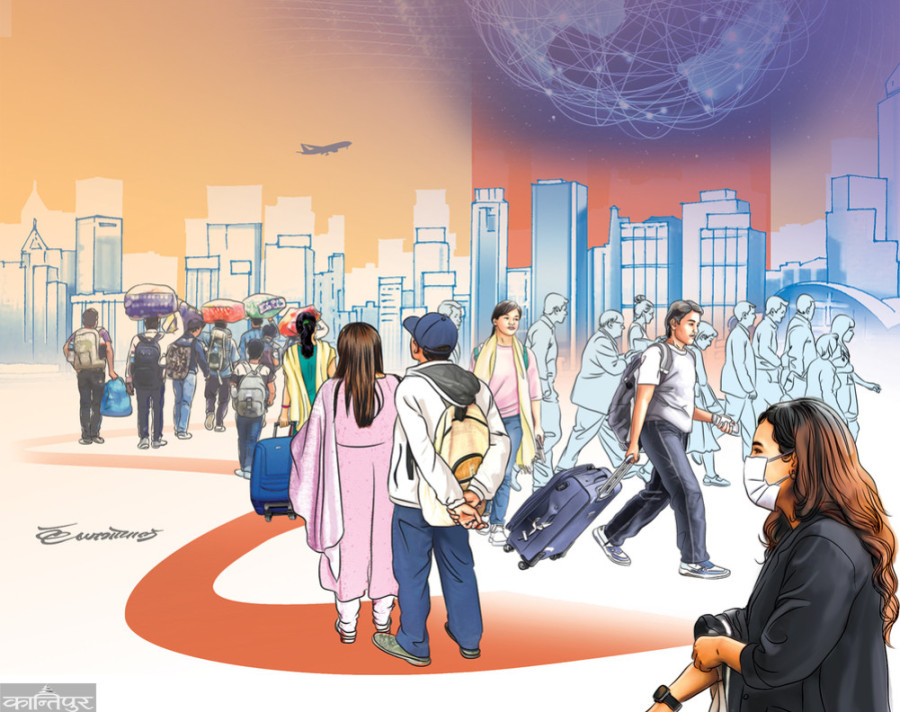Columns
Let Nepalis leave with ease
If we keep making it this hard to leave, we will ensure that those who do manage to leave will never return.
Sanitya Kalika
At Nepal’s airports, immigration officers do not just check your passport—they check your purpose in life. If you are leaving for work, you must show a Labour Permit issued by the Department of Labour. If you are going abroad to study, you must present a No Objection Certificate (NOC) from the Ministry of Education. And if you lack those, your boarding pass is revoked, and you are sent back home.
It matters not whether you have a safe job at a Fortune 500 company or a full-ride scholarship to attend Oxford University. These rules apply to every worker and every student, without individual assessment. They are, in all but name, blanket bans—and they violate the very human rights Nepal has pledged to uphold.
A few years ago, a Nepali lawyer was admitted to Harvard Law School on a full scholarship. The Ministry of Education refused his NOC because the Harvard LLM lasts nine months (two semesters)—and the NOC guidelines ban certificates for courses shorter than 12 months. US universities consider nine months as “one academic year”, but the guideline-makers in the government could not comprehend anything beyond “12 months is equal to one year”. After days of wrangling and signing a redundant affidavit promising to “take responsibility if Nepal later refused to ‘recognise’ the degree”—something that already exists in every NOC’s template—he finally managed to score an NOC and flew to Boston. Nine months later, he graduated with flying colours and won a competitive Harvard-funded post-graduate fellowship, which allows a recent graduate to work with an international organisation in Geneva.
Following graduation, he returned to Nepal to spend his summer, after which he was set to move to Geneva. At the airport, an immigration officer demanded a labour permit from him. He had a hard time explaining how it was a fellowship, not a job, and how the Department of Labour did not process a permit for a Geneva-based work funded by an American university. Conceivably, due to his confidence, rich travel history, passport filled with stamps and fluent English—coupled perhaps with the immigration officer’s rare green-tapist leniency—he was rather exceptionally allowed to board his flight.
This arbitrary use of state power does not just clip a citizen’s dreams; it also violates international laws binding Nepal. Article 13(2) of the Universal Declaration of Human Rights unequivocally states that everyone has the right to leave their country. The International Covenant on Civil and Political Rights (ICCPR), which Nepal ratified in 1991 as legally binding, reiterates the same principle in Article 12(2). Similarly, Article 8 of the Migrant Workers Convention, which Nepal acceded to in 2002, also affirms the right of a Nepalese citizen to leave their country.
General Comment No. 27 of 1999 of the UN Human Rights Committee (HRC)—an authoritative interpretation of the ICCPR—holds that the right to leave “may not be made dependent on any specific purpose”. Blanket, category-wide restrictions such as “no student can leave without an NOC” or “no worker can leave without a Labour Permit” are seldom permissible under these international laws.
In addition to its General Comment, the HRC in the landmark case of Loubna El Ghar v. Libya had struck down a Libyan domestic law—i.e., a ‘security clearance requirement’ applied by the government to the people. Similarly, in the El Dernawi v. Libya case, the Committee found blanket travel bans unlawful for lack of individual necessity. Closer to home, in the 2020 Lenin Bista case, the Supreme Court of Nepal held that an immigration officer cannot stop a citizen from travelling unless there is a specific legal basis—citing Article 12 of the ICCPR. Bista, who had been blocked at the airport and told he needed “permission from the concerned authority”, decided to take the issue to the Supreme Court. Many others could not—and quietly saw their hard-earned opportunities to work or study abroad vanish.
Defenders of these arbitrary rules on exit control often argue that this is the only way for the government to curb human trafficking. Yes, trafficking is real—and needs to be curbed—but blanket bans in the guise of an NOC or a labour permit are blunt instruments that hurt the wrong people. Genuine trafficking prevention means identifying high-risk cases and perpetrators, regulating recruitment agencies and educational consultancy companies and raising awareness among travellers. Countries with far more migrant workers than Nepal protect them without locking all of them in. Instead, our policies irritate and stymie bright, law-abiding citizens and make them spend weeks in queues and on affidavit-writing. Not everyone can navigate these shadowy corridors without conviction, reach or bribes (or a combination of these).
Many who endure this bureaucratic red tape leave the country and vow never to return. This is how even patriotic Nepalis who would otherwise gladly return to contribute to their homeland are pushed to settle abroad permanently because they never know if they can ever get out once they get in! If we keep making it this hard to leave, we will ensure that those who do manage to get out will never return—not because their immigration status in their countries of domicile is uncertain, but because their going back after a short break is unpredictable. It is high time that the government realises that it can safeguard its citizens without clipping their wings—and repeals these Pyongyang-esque laws.
To combat trafficking, the government can mandate an online registration for migrant workers, with targeted checks in high-risk industries and pre-departure orientations. For students, the government can collaborate with universities, provide financial counselling and maintain a post-departure data tracking system. The immigration officers at airports, however, should limit themselves to checking passports, visas, and any genuine risk indicators—not the purpose-based paperwork that treats adults like coddled wards of the state.
Nepal has promised to the international community—in the Universal Declaration of Human Rights, the ICCPR and the Migrant Workers Convention—to uphold the right of its citizens to leave their country at will. Domestically, Section 9(1) of Nepal Treaty Act 1990, extends that international promise to our domestic plane. Right now, the government is breaking that promise daily and trying hard to frustrate its citizens right before they leave. While Article 45 of the Constitution of Nepal guarantees a citizen’s right against exile, they are in dire need of an Article 45A that guarantees their right to leave. Because in the end, the freedom to depart is as fundamental as the freedom to stay.




 9.93°C Kathmandu
9.93°C Kathmandu















